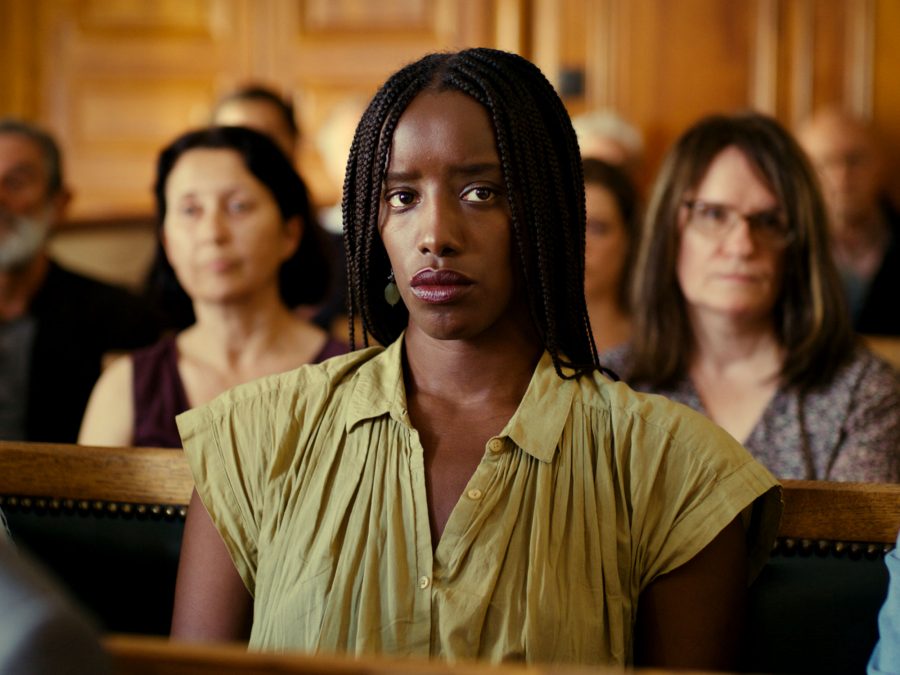Cut-away reaction shots in cinema are employed as a crutch – a way for a director to keep an audience locked into a contrived emotional wave pattern. For the most part, they tend to be evil, a shortcut to manipulation and crass sentimentality. In her fiction feature debut, Saint Omer, French filmmaker Alice Diop elevates the humble reaction shot to the level of high art, drawing on a gallery of gaunt faces who are completely lost as to how they should react to what they’re seeing and hearing.
The intense confusion, the fiery incomprehension, the sadness that manifests beyond reason all serve to enhance the already-crushing central drama in which a fallen woman stands in the dock of a provincial French courtroom and attempts to engineer a justification for unspeakable crimes.
Laurence Coly (Guslagie Malanga), clad in a simple brown cardigan, stands accused of leaving her 15-month-old daughter on a beach at night during high tide, and the function of this court hearing is to determine why she would commit such an act. Watching intently and distraughtly with her notebook is Rama (Kayije Kagame), a Parisian academic whose studies err towards depictions of female trauma and violence such as ‘Medea’ and the works of author and filmmaker Marguerite Duras.
Although it’s never directly stated, and Diop is not too insistent in making (or, at least, agreeing with) these connections, Rama clearly heads along to the trail seeing Coly as a real-life example of a tragic literary heroine. The reality – and it’s a reality that makes this film so extraordinary – is far more complex.

Coly’s testimony paints a picture of a troubled woman, an intellectual (possibly pseudo), versed in philosophy, who admits to having made a number of questionable decisions in her life on the precipitous path to happiness. The judge (Valérie Dréville) fires questions at her in order to amply flesh out this portrait, and as Coly talks, little contradictions and inconsistencies begin to mount.
Malanga is, for the majority of the film, completely stone-faced, even when she describes in harrowing detail the days, hours and minutes leading up to the moment which has landed her in prison, possibly for the remainder of her life. It’s a remarkable anti-performance where words and language are all-but stripped of external emotion and left to become their own confounding mode of expression. Is this Coly’s calculated modus operandi? Or has this experience transformed her into this passive husk who perhaps sees this crime as the natural outcome of the collected traumas from which she suffered?
With Saint Omer, Diop not only refreshes and expands upon the tired conventions of the courtroom drama, but she really drills down into the fundamental gaps in our understanding of human nature and the tantalising but illusive ‘why?’ of it all. Coly is not a case study. She is an enigma of the Charles Foster Kane variety, and Diop’s coup to grace is to inform us that, in this instance, there was no Rosebud. There rarely is.
Little White Lies is committed to championing great movies and the talented people who make them.
ANTICIPATION.
A major competition slot at a film festival confirmed that Alice Diop was a name to remember. 4
ENJOYMENT.
An astonishing feat of ambiguity and emotion. And visually, every shot lands a sucker punch. 4
IN RETROSPECT.
The standard for ‘Best of 2023’ lists has already been set. 5
Directed by
Alice Diop
Starring
Guslagie Malanda, Kayije Kagame, Valérie Dréville
The post Saint Omer appeared first on Little White Lies.
from Little White Lies https://ift.tt/JTm2UPr
via IFTTT

0 Comments